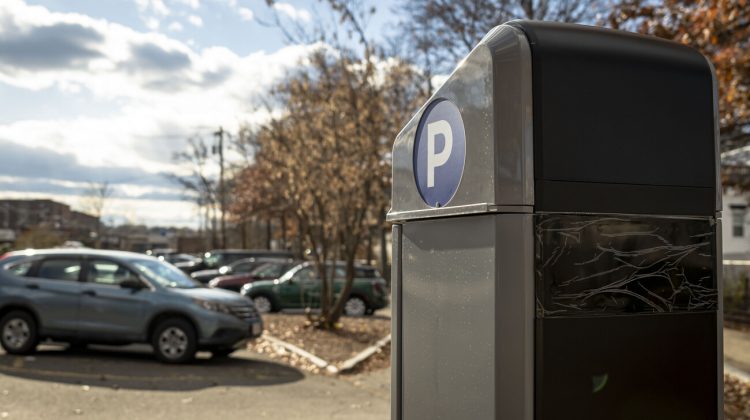PEABODY — After at least five years of work, the city has a new ordinance governing parking downtown, bringing rules and regulations in the area up to date with a variety of projects undertaken by various city departments to completely overhaul the area.
Community Development Director Curt Bellavance submitted a memo to the City Council, and the Legal Affairs Committee in particular, outlining the different proposed changes in the ordinance and the ways in which the city has worked to upgrade the area. Bellavance also appeared before the committee at a meeting this month, telling councilors there that he looked at amending the city’s parking ordinance as early as 2018.
As the city was prepared to move forward with replacing meters downtown using $200,000 in grant funding, the COVID-19 pandemic struck, leaving officials in a holding pattern as they assessed the pandemic’s impact on the city. During that time, the city received two additional grants totaling $270,000 to implement additional lighting, particularly in the municipal lots downtown, and the Peabody Municipal Light Plant landed a $260,000 grant to install six electric-vehicle charging stations in the city, Bellavance said.
Bellavance emphasized that the entire project is fully funded through grants.
With the grant funding in hand, city officials, along with the Police Department, worked to overhaul the ordinance governing downtown parking, which Bellavance said had likely not been looked at in years. What resulted was a sprawling document laying out a number of new regulations meant to better serve the city’s downtown, which has been the focus of revitalization efforts in recent years, and updates to coincide with the grant awards.
Among those changes are a suite of new meters along streets downtown and kiosks in municipal lots, each equipped with functionality allowing the Police Department to push messages out to residents; an increase of the maximum parking time on Main Street from one hour to two; an increase of the parking time in the city’s municipal lots from two hours to four; a reduction of the fee for a residential sticker from $1,000 to $600; and an increase of penalties for violating the ordinance from $5 to $20, and to $100 for parking in a handicapped space without proper documentation.
Ward 2 Councilor Peter McGinn, a member of the committee, emphasized the sheer amount of work that went into crafting the new ordinance, noting it represents the opinions of numerous officials and stakeholders. McGinn said the origins of the project can be traced back to a May 2016 from the Peabody Downtown Action Team, the predecessor organization to Peabody Main Streets, but acknowledged that a concentrated effort on the part of the city did not begin until 2018.
And while the project stalled for nearly a year and a half during the pandemic, work did not, McGinn said.
When the project did restart — with the Department of Community Development serving as the “quarterback of this entire effort,” according to McGinn — it became apparent that the city would be best served consolidating multiple projects into one larger initiative. Now, after a years-long process, the city is set to complete construction and installation next month, after that effort began in June.
McGinn told councilors the ordinance had large sections entirely removed and replaced, which made the document “longer than it needed to be.” And, the new ordinance gives the City Council additional flexibility to govern parking regulations by setting out fees and other items as established by resolution.
“The idea here is that under the new ordinances that we’ll adopt, it would be easier for the council to adjust fees for all sorts of things because it can be done by resolution rather than the extensive process of changing an ordinance,” McGinn said.
And while McGinn acknowledged the document was imperfect, he urged adoption in part to allow the Police Department to begin enforcing regulations tied to the new infrastructure downtown. He noted that the earliest Mayor Ted Bettencourt could sign the ordinance and enact it would be Dec. 15, after it is advertised.
“This is really supportive of a park-once approach that would have downtown patrons doing multiple things in their one trip to the downtown,” McGinn said.
Ward 3 Councilor Stephanie Peach said she supported the new ordinance and understood the importance of moving forward with the initiative. But, Peach raised several issues, most prominently with the establishment of an overnight parking ban in the municipal lots, which she feared could lead to additional drunk-driving accidents.
Councilor-at-Large Ryan Melville praised the ordinance and the project writ large for its data-gathering potential.
“So much of what we talk about downtown is anecdotal,” he said. “I really do think that part of this is going to be analyzing the data we collect on this.”
“This is the step that needs to be taken to get to the point that we can actually start doing some of this,” Melville added.
Councilor-at-Large Tom Rossignol urged the implementation of a cleaning schedule for Central, Foster, and Main streets, which he said would be “vital for maintaining downtown.”
Ward 4 Councilor Julie Daigle raised questions about snow removal and how the city would manage parking in municipal lots during snow emergencies.
Melville steered the conversation back to the ordinance itself.
“I don’t want to start adding on to something already agreed upon by a number of agencies,” he said.
The ordinance ultimately passed the Legal Affairs Committee unanimously and cleared the full council with a 9-1 vote, with only Rossignol voting against advertising and ultimately implementing the new ordinance. He had sought a firm date at which the council would return to the issues raised regarding snow removal, cleaning, and overnight parking, but did not get one.

